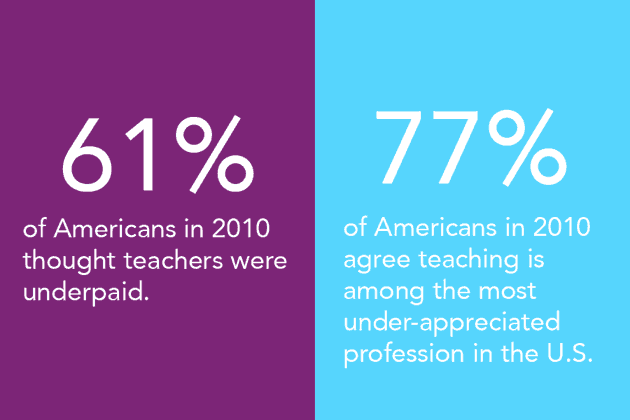1. Teaching by protest
Schools in Oklahoma and Kentucky closed for a second day while teachers protested for better wages in their state capitals. In Oklahoma, Gov. Mary Fallin signed off to raise teacher's pay from 15 to 18 percent, but those protesting said "that's not good enough." One third grade teacher told NBC, "If I didn't have a second job, I'd be on food stamps."
It's uncertain how long the protest will go, but many teachers are saying they plan to protest until they get the increases they want.
Something to chew if your child announces their class made the teacher cry...
Let's write a thank you card.
Over the past 60 years, pay for teachers fell sharply compared to other college degree workers. Now nationally, teachers earn 50% less pay than other workers with four years of college. And while it won't fix everything, saying thanks can go a long way. If you want help teaching your child how to write a more sincere thank you, use these prompts below:
- Why do you think your teacher goes through all the effort of planning lessons for you?
- What do you specifically like about your teacher?
- What is something you've learned from this teacher?
- When is a time your teacher helped you?
2. Stuck in a pipe dream (or nightmare)
A 13-year-old thought he "was going to die" when got trapped in the Los Angeles sewer system on Sunday, April 1. Jesse Hernandez was playing in a shack in Los Angeles's Griffith Park when he fell through the floorboards and into a pipe. Hernandez plunged about 25 feet into the city's sewer network and was stuck there for 13 hours. Hernandez was rescued on Monday when rescuers dropped a floating camera in a manhole to ascertain his location and bring him to safety.
Something to chew on when your son tells you to look out for crocodiles in the storm drain (again)...
As you know, tall tales spread like chicken pox across the playground. All it takes is one kid hearing about how a boy got stuck in a sewer to generate concerns about toilets, pipes and wooden floorboards - and more often than not the story becomes fueled by imagination rather than fact.
Head of Montreal Children's Hospital anxiety clinic, child psychiatrist Klaus Minde recommends parents explain the truth of "scary things" but if fears persist, to leave it alone. "After three or four times, you just say, 'You know the answer.' Otherwise it validates [the fear]. It makes it more important than it really is."
Ask:
- Why are you afraid of that?
- How do you know that's true?
3. Daily Data
_source: Time



